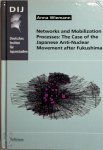Anna Wiemann - Networks and Mobilization Processes: The Case of
| Schrijver: | Anna Wiemann |
|---|---|
| Titel: | Networks and Mobilization Processes: The Case of the Japanese Anti-Nuclear Movement after Fukushima |
| ISBN: | 9783862050499 |
| Uitgever: | IUDICIUM Verlag |
| Bijzonderheden: | Goed, 2018, Hardback, 267p |
| Prijs: | € 29,50 |
| Verzendkosten: | € 4,50 (binnen Nederland) |
| Meer info: |
Environmental disasters or other large-scale disruptive events often \ttrigger the emergence of social movements demanding social and/or political \tchange. This study investigates mobilization processes at the meso level of \tthe Japanese anti-nuclear movement after the nuclear disaster at the \tFukushima Daiichi nuclear power plant caused by the Great East Japan \tEarthquake and subsequent tsunami waves on March 11, 2011. To capture such \tmeso level movement dynamics – which so far have played only a minor role in \tresearch on social movement mobilization – the study presents an analytical \tmodel based on premises from political process theory, network theory, and \trelational sociology. This model is then applied to the case of the Japanese \tanti-nuclear movement after Fukushima by looking at the relational dynamics \tof two coalitional movement networks engaged in advocacy-related activities \tin Tōkyō. The first case study is e-shift, a network-coalition working for \tnuclear phase-out and the promotion of renewable energy; the other is SHSK \t(Shienhō Shimin Kaigi), a coalition pushing for the rights of people \taffected by radioactive contamination and/or evacuation from contaminated \tareas. The study traces the mobilization processes of these two networks by \tanalyzing data gathered in 2013 and 2014 in the form of participant \tobservation of movement events, semi-structured interviews with movement \torganization representatives, and documentary data.
|

De verkoper zal binnen 3 werkdagen contact met u opnemen om de koop verder af te handelen.

